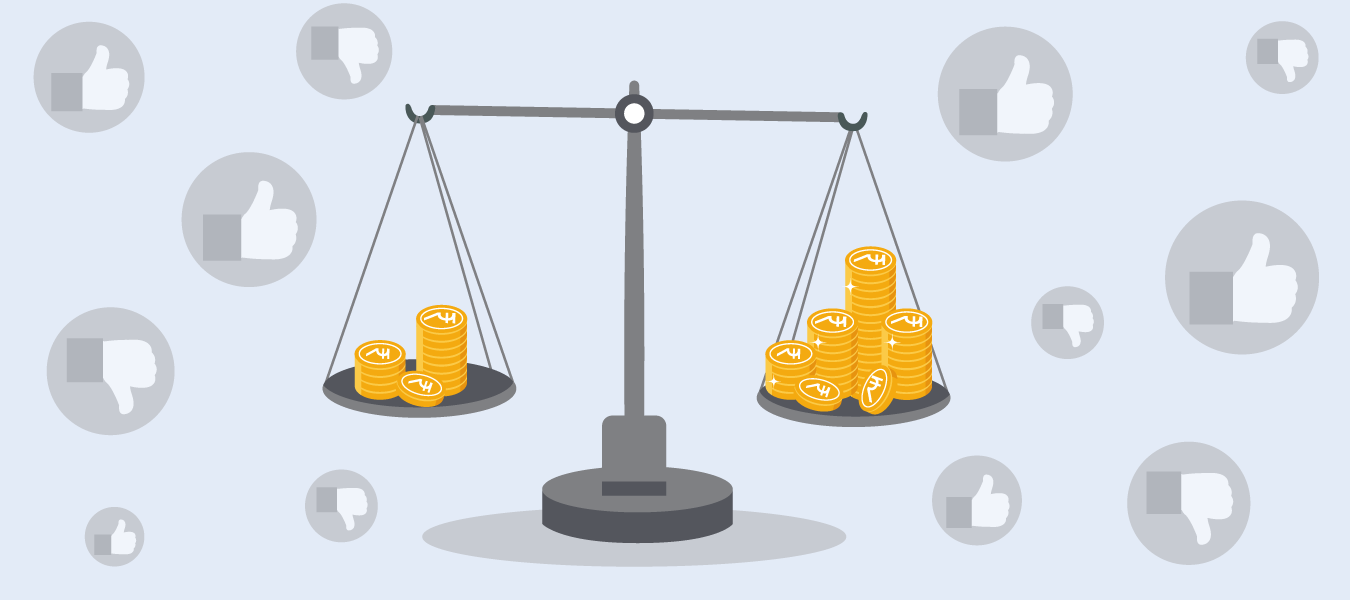It is believed that individuals below the tax bracket of 30% can benefit a lot from high basic pay. Contrary to this, individuals above this tax bracket of 30% can benefit from low basic pay. This is because the superannuation or retirement benefits have to be approximately 27% of the basic pay.
Usually, 12% is deducted in EPF for employees under the tax slab of 10% or 20%. Rest 15% is deducted as a part of superannuation. Hence, if the basic pay is more, retirement benefits can be more. For a person with tax slab of 30%, this won’t make much of a difference.
High or Low Basic Salary
A jobseeker can be over the moon at the prospect of a hike in basic salary.
-
- Who wouldn’t be?
- A hike is an increase in compensation so it’s natural for anyone to jump at the opportunity.
- But what about a low basic salary? Can it be beneficial?
- You’re barking up the wrong tree if you think it doesn’t.
So, should someone go for a high or a low basic salary? Let’s take a look. But first…
What Percentage of Gross Salary is Basic Pay?
When switching jobs, a candidate should always consider the basic pay. It should be high enough to accommodate requirements.
Experts believe that a cost-optimized and best salary structure to save tax is to have 40% to 50% of the gross salary as basic pay. This percentage of basic salary ensures that the take-home pay is considerably hefty, and can reduce taxes.
Usually, most of the Indian employers prefer keeping basic salary low as it helps them reduce the CTC. If the basic salary is not amounting to half or 40% of the full salary, salary renegotiations must be considered.
Why You Should Choose High Basic Pay?
- When basic pay is more, gratuity is more. This means that higher benefits upon retirement or resignation from job.
- Increments and bonuses are usually based on basic pay. If the basic is less than 40%, increments and bonuses aren’t lucrative.
- Lastly, HRA and DA is calculated based on basic pay. HRA computes to 40-50% of basic pay, and DA 125% (for government employees only).
Why You Should Choose Low Basic Pay?
A low basic pay comes handy during the course of salary restructuring to minimize income tax.
As allowances increase, so do the tax-saving components. Hence, if the motive is to improve the tax saving factor, then a low basic pay may be beneficial.
For instance, an employer could reduce a part of your basic pay and offer food allowance to help the employee save tax.
But do note that this type of structure can benefit people who are in the 30% tax slab. This can reduce their tax payments considerably.
Can the Employer Reduce Basic Salary?
Usually, it is easier to negotiate salary structure in small organizations. In larger organizations, one should understand salary bifurcations and allowances and how they impact taxes first before negotiating tax structure.
Conclusion
High basic salary is beneficial for some individuals and not so much for others. People in the tax slab of 10% to 20% can benefit a lot from high basic pay because this will give them a chance to build on their retirement savings. However, people who fall under the tax slab of 30% may benefit more from allowances as that will help them save their taxes.
FAQs on High Basic Salary:
Is it beneficial to get a high starting salary?
Because basic compensation is always taxed, it should not exceed 40 per cent of the costs to the firm. Nevertheless, it shouldn’t be maintained too low because this would lead to a significant decrease in other components of the wage.
What is the starting salary?
Typically, the base wage ranges from 40percentage points to 50percentage points of your CTC. Mandatory elements such as bonuses, PF, gratuities, and other perks are based on fundamental pay. Any change in basic compensation might have an impact on a worker’s CTC.
In Indian countries, what’s the highest basic salary?
The Seventh Pay Commission: The maximum base salary is Rs 2.5 lakh, while the HRA is Rs sixty thousand. There are now 43 lakh national government workers and fifty-three lakh retirees. The 7th Pay Committee will significantly enhance the base compensation of government workers.








